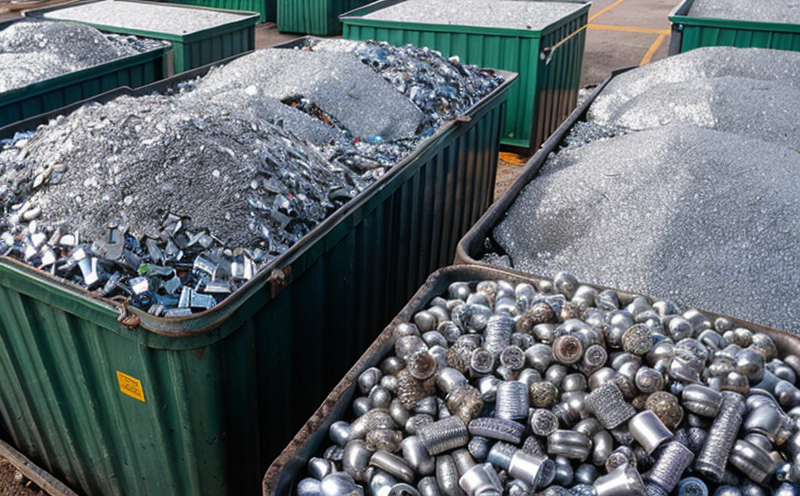ASTM E128 Cadmium Content in Recycled Metals
The ASTM E128 standard is a critical tool for ensuring that recycled metals meet stringent environmental and safety regulations. This testing service focuses on quantifying the cadmium content in recycled metal materials, which is essential to prevent contamination of newly manufactured products and to comply with international standards.
Recycling plays a pivotal role in reducing waste and conserving natural resources. However, the process can introduce impurities into metals, including cadmium, which poses significant health risks if not controlled. ASTM E128 provides a standardized method for determining the amount of cadmium present in recycled metal products. This helps manufacturers ensure that their final products are safe for use.
The test outlined by ASTM E128 involves several steps, starting with sample preparation. Raw materials from recycling processes undergo thorough cleaning and mechanical processing to remove any non-metallic components. The resulting metallic samples are then dissolved using appropriate chemicals before being analyzed via atomic absorption spectrophotometry (AAS). This technique allows for precise measurement of trace elements like cadmium.
Compliance with ASTM E128 ensures that recycled metals meet the specified limits set forth in this standard, typically around 0.05% by weight or less depending on intended use. By adhering to these guidelines, industries can mitigate risks associated with high levels of cadmium in end products such as automotive components, electronics, and construction materials.
Our laboratory employs state-of-the-art equipment and experienced technicians who follow rigorous protocols when conducting ASTM E128 tests. We guarantee accurate results that help our clients maintain regulatory compliance and enhance product quality across various sectors including automotive manufacturing, electronics production, and building construction.
In summary, ASTM E128 Cadmium Content in Recycled Metals is a vital service for those involved in the recycling industry who require reliable data on cadmium levels within their materials. Proper testing not only protects human health but also supports sustainable practices by ensuring that recycled metals remain safe and suitable for reuse.
Quality and Reliability Assurance
At our laboratory, we strive to provide the highest level of quality assurance in every aspect of our operations. Ensuring accurate and reliable results is crucial when it comes to ASTM E128 Cadmium Content in Recycled Metals testing because even small deviations can have significant consequences for both manufacturers and consumers.
- Accurate Instrumentation: We use advanced atomic absorption spectrophotometers that are regularly calibrated according to manufacturer specifications. These instruments ensure precise measurements of cadmium content down to trace levels.
- Standard Operating Procedures (SOPs): Our team adheres strictly to established SOPs which outline step-by-step procedures for sample preparation, dissolution methods, and analysis techniques used during ASTM E128 testing. This consistency helps minimize human error and maintains high standards of accuracy.
- Trained Personnel: All our technicians undergo extensive training on the latest methodologies and best practices related to metal recycling analysis. They are kept updated with industry developments through continuous professional development programs.
- Quality Control Measures: Regular internal audits, external reviews by independent experts, and participation in proficiency testing programs further reinforce our commitment to delivering consistent high-quality results.
We take pride in maintaining strict adherence to international standards such as ASTM E128, ensuring that all tests performed at our facility meet or exceed these requirements. By doing so, we help our clients build trust with their customers while complying with local and global regulations governing environmental protection and occupational safety.
Competitive Advantage and Market Impact
The ability to accurately measure cadmium content in recycled metals offers several competitive advantages for businesses operating within the waste management & recycling sector. Here are some key points highlighting how this service can impact your organization:
- Enhanced Reputation: Demonstrating compliance with ASTM E128 enhances your company's reputation among stakeholders, including customers, investors, and regulatory bodies.
- Informed Decision Making: Understanding cadmium levels allows for informed decisions regarding which recycled materials to use in production processes. This knowledge ensures that only safe and compliant metals are incorporated into finished goods.
- Avoidance of Legal Penalties: By ensuring that your products comply with relevant regulations, you can avoid costly fines and legal actions associated with non-compliance.
- Promotion of Sustainable Practices: Implementing ASTM E128 testing contributes positively to the environment by promoting responsible recycling practices that protect public health.
In today’s competitive market, maintaining a strong commitment to quality control and regulatory compliance is essential. Our laboratory's expertise in ASTM E128 Cadmium Content in Recycled Metals testing enables your organization to stay ahead of competitors who may not prioritize these important factors.
Use Cases and Application Examples
The application of ASTM E128 Cadmium Content in Recycled Metals extends beyond mere compliance; it has direct implications for product design, manufacturing processes, and end-user safety. Below are some practical examples showcasing how this service can be utilized:
- Automotive Industry: Automotive manufacturers often source recycled metals to reduce costs while meeting sustainability goals. By testing these materials using ASTM E128, they ensure that the cadmium levels do not exceed allowable thresholds.
- Electronics Manufacturing: Electronic devices contain numerous components made from various types of metal alloys. Ensuring that cadmium content is within acceptable limits helps protect workers during production and end-users who interact with these devices.
- Construction Sector: Buildings frequently incorporate recycled steel and aluminum into their structures. ASTM E128 testing ensures that the cadmium levels in these materials comply with building codes and safety standards.
In addition to these sectors, ASTM E128 Cadmium Content in Recycled Metals also finds relevance in other industries like medical device manufacturing where stringent quality controls are necessary for ensuring patient safety.
Our laboratory provides comprehensive testing services tailored specifically towards meeting the needs of different clients across diverse fields. Whether you're an established player or a startup looking to enter new markets, our expertise can help you navigate regulatory requirements confidently and effectively.





